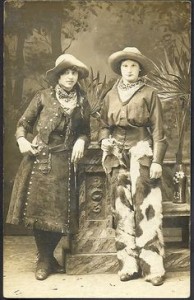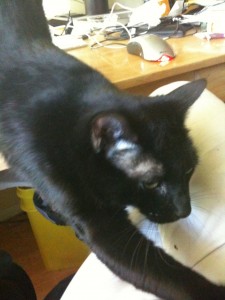
The question of hiring an editor often comes up in my classes, and since editor for hire is one of the hats I wear, I wanted to provide some overview. There are different kinds of edits. I’m focusing on two: the developmental edit versus the copy edit. You might also hire someone to proofread, where they are simply looking for mistakes and errors, rather than making any editorial suggestions.
...
 I just finished the first pass on the slushpile for If This Goes On. The anthology is intended to be half solicited manuscripts; half from the open call, and I’m happy to say that I don’t think it’s going to be hard to pull that together. I’ve got five or six definites on my list right now, and I’m setting them aside. I did read through every story except for a handful of less-than-serious ones; thank you to the slushreaders and publisher Colin Coyle for winnowing those out.
I just finished the first pass on the slushpile for If This Goes On. The anthology is intended to be half solicited manuscripts; half from the open call, and I’m happy to say that I don’t think it’s going to be hard to pull that together. I’ve got five or six definites on my list right now, and I’m setting them aside. I did read through every story except for a handful of less-than-serious ones; thank you to the slushreaders and publisher Colin Coyle for winnowing those out.
If I can, I’ll take one more pass through the first third or so of the slushpile, when I was reading and not knowing how strong some of the submissions would be. I suspect at least a third of those can be winnowed. Then I’ll ask the publisher to send out that round of rejections.
By then I am hoping I’ll have narrowed things down to a few dozen stories. These manuscripts have officially made it to the final round. At this point I’ll be looking at some things that include:
Then will come the final passes, where I’ll be reluctantly saying goodbye to some stories for reasons that might include:
I hope that the slushreaders have learned something from all of this, including a better sense of what submitters may or may not want to avoid, and how varied the slush pile can be. With a few of them we’ve done some talking about stories, but not all. For most slushreaders, I would suggest if you’re passing up more than half the stories, you are not being harsh enough, but if it’s only one in ten, you may be leaving out some stuff the editor will want to see, unless your tastes are perfectly aligned.
...

So I’ll be open to submissions from March 15 through March 31 for the Women Destroying Fantasy issue. Here are some of my wants and a couple of things that will turn me off.
- I want fantasy that showcases the amazing emotional range of the genre and the spectrum of forms it can take.
- I’ll want at least one tearjerker and one humorous piece.
- I’ll want something that draws on fairytale or myth, but which does so in an amazing, interesting, and fresh way, and I’m hoping to find something that feels urban fantasy-ish as well, also in a fresh and interesting way.
- Fantasy that often hits well with me: superheroes, non-cutesy talking animals, linguistic-related, the weird.
- I like language: make yours wonderful, but never at the cost of the story.
- Your character should make me care about their fate (and for this issue, probably a female protagonist is, quite frankly, probably going to be a better fit).
- I’ll want at least one piece with an utterly amazing landscape, that immerses me in a fantasy world that delights my heart.
- Diversity does matter to me. It doesn’t trump quality, but when you’re going to be up against the very best, score your points where you can.
I don’t want retellings of D&D adventures. Or pirates. I really don’t like pirates (got exposed to an awful lot of fantasy pirate stories while at Fantasy Magazine) and I’m not particularly fond of zombies. Typos are another big turn-off: proofread your work.
This is not a time to go for the low-hanging fruit or play it safe. I have four, count ’em, four slots. Send me something — but make it the very best you have, something that is unique to your voice, something that you and only you could write.
...

Cons and their pros:
Chance to connect with people. To make the most of this, do a little legwork beforehand and contact the people you want to make sure to connect with, try to have coffee or lunch or whatever. Sometimes people buy me lunches or drinks at cons in return for asking advice; if you plan on really pumping someone for info, this is a graceful gesture, and one I need to be better about.
Chance to build some recognition. To make the most of this – participate in panels and be a good participant who comes with some interesting things to say and has done a little thinking and/or research beforehand. Also, be good at public speaking. If you want to do this and are bad at it, it might be worth investing some time into practice. Connie Willis told me Toastmasters participation is very good for this. If you really want to make the most of panel participation, take notes to use as blog post fodder (and then remember to post them, I always think I will and manage it about 1 time out of 3.)
Chance to sell things. Have promotional material and think about how you’re going to use it. In my experience, stacks of postcards dumped on a table yield little return; it’s much better to be passing them out yourself and talking them up a little. Here again – be a good guest first and a sales rep second.
And they can be fun!
Cons and their cons:
They’re expensive! Be aware some of that may be tax deductible and if so, keep your receipts scrupulously. Ways to save at a con – get a roommate, bring a box of granola bars so you can skip the inevitably expensive hotel breakfast, learn where the sources of free food at a con usually are (con suite and green room are usually a good place to start for that, also parties).
They take time away from writing. Take a notebook with you and spend some time doing it, but also remember that con time is work-time for you, and treat yourself accordingly.
I just came back from a GoH stint at MidSouthCon. While I was there, I tried to be a good guest — I participated in everything asked of me, I spent time mingling, I was friendly and approachable for fans, and I made sure I knew what was expected of me. (Which made a great con experience even greater!)
I should have spent more time researching the dealer’s room and making sure the dealers had my books if I’d wanted to be even better about things. I did take a number of books, but mainly I swapped them or gave them away as thank yous while there.
And hey, I’m reading there tomorrow at 11, come see me! It’ll be the story from Apex, “So Glad We Had This Time Together,” which I think most of you haven’t heard. Talk to me while you’re there, and I’ll give you a coupon for $50 off an upcoming online class! (To see what’s coming up, click on “Upcoming Classes” up above.
Enjoy this advice on writers and conventions and want more content like it? Check out the classes Cat gives via the Rambo Academy for Wayward Writers, which offers both on-demand and live online writing classes for fantasy and science fiction writers from Cat and other authors, including Ann Leckie, Seanan McGuire, Fran Wilde and other talents! All classes include three free slots.
Prefer to opt for weekly interaction, advice, opportunities to ask questions, and access to the Chez Rambo Discord community and critique group? Check out Cat’s Patreon. Or sample her writing here.
...

Some people are taking the class in order to edit their own stuff, others to edit for other folks, a couple for a combination of that. We talked about what a developmental edit is intended to do, and how it’s different from a copy-edit. In fact, you want to avoid copy-editing (other than a couple of cases which I’ll get to in a minute) because often that sentence you’re tinkering with will end up discarded or substantially revised in the final version.
Honing your editing ability to where you can trust it is one way to free yourself up when writing. Instead of listening to the internal editor telling you that sentence isn’t perfect or that you need to check that name on Wikipedia before using it, you can assure that editor it will get its chance during the revision process and go on writing.
...
Want access to a lively community of writers and readers, free writing classes, co-working sessions, special speakers, weekly writing games, random pictures and MORE for as little as $2? Check out Cat’s Patreon campaign.

"(On the writing F&SF workshop) Wanted to crow and say thanks: the first story I wrote after taking your class was my very first sale. Coincidence? nah….thanks so much."

(Fiction, short story) The thing is, I was never a hero. The first wave of aliens taught me that. The war with them – my older brothers became heroes there, one died in the stand-off at Ucer-25, and we never did discover what happened to the other. My parents celebrated them both, burned scarlet and gold candles that made the house smell like flaming trees and sulphur, every weekend without fail…


This site is protected by reCAPTCHA and the Google Privacy Policy and Terms of Service apply. This site is a participant in the Amazon Services LLC Associates Program, an affiliate advertising program designed to provide a means for sites to earn advertising fees by advertising and linking to Amazon.com.